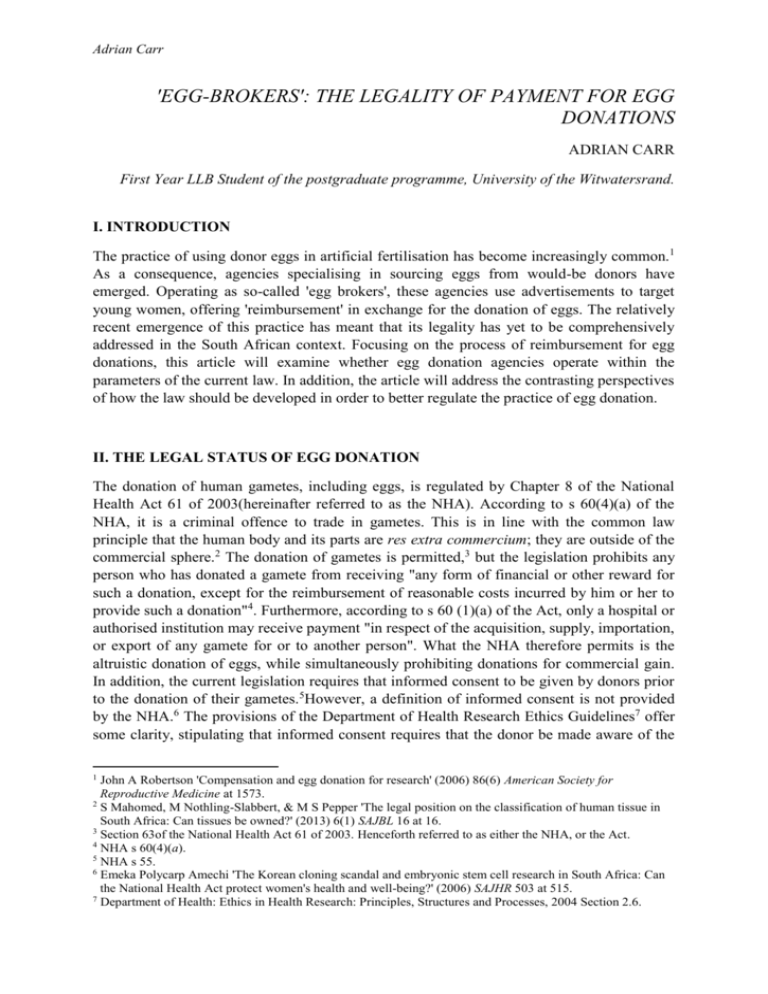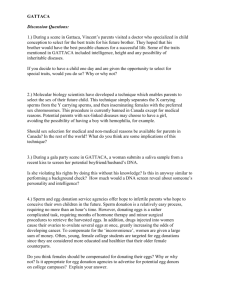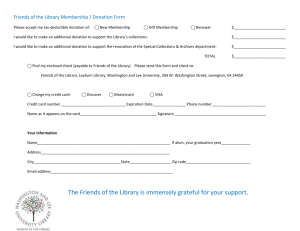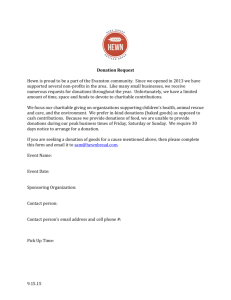2015_Inkundla_2 - Inkundlajournal.org
advertisement

Adrian Carr 'EGG-BROKERS': THE LEGALITY OF PAYMENT FOR EGG DONATIONS ADRIAN CARR First Year LLB Student of the postgraduate programme, University of the Witwatersrand. I. INTRODUCTION The practice of using donor eggs in artificial fertilisation has become increasingly common.1 As a consequence, agencies specialising in sourcing eggs from would-be donors have emerged. Operating as so-called 'egg brokers', these agencies use advertisements to target young women, offering 'reimbursement' in exchange for the donation of eggs. The relatively recent emergence of this practice has meant that its legality has yet to be comprehensively addressed in the South African context. Focusing on the process of reimbursement for egg donations, this article will examine whether egg donation agencies operate within the parameters of the current law. In addition, the article will address the contrasting perspectives of how the law should be developed in order to better regulate the practice of egg donation. II. THE LEGAL STATUS OF EGG DONATION The donation of human gametes, including eggs, is regulated by Chapter 8 of the National Health Act 61 of 2003(hereinafter referred to as the NHA). According to s 60(4)(a) of the NHA, it is a criminal offence to trade in gametes. This is in line with the common law principle that the human body and its parts are res extra commercium; they are outside of the commercial sphere.2 The donation of gametes is permitted,3 but the legislation prohibits any person who has donated a gamete from receiving "any form of financial or other reward for such a donation, except for the reimbursement of reasonable costs incurred by him or her to provide such a donation"4. Furthermore, according to s 60 (1)(a) of the Act, only a hospital or authorised institution may receive payment "in respect of the acquisition, supply, importation, or export of any gamete for or to another person". What the NHA therefore permits is the altruistic donation of eggs, while simultaneously prohibiting donations for commercial gain. In addition, the current legislation requires that informed consent to be given by donors prior to the donation of their gametes.5However, a definition of informed consent is not provided by the NHA.6 The provisions of the Department of Health Research Ethics Guidelines7 offer some clarity, stipulating that informed consent requires that the donor be made aware of the 1 John A Robertson 'Compensation and egg donation for research' (2006) 86(6) American Society for Reproductive Medicine at 1573. 2 S Mahomed, M Nothling-Slabbert, & M S Pepper 'The legal position on the classification of human tissue in South Africa: Can tissues be owned?' (2013) 6(1) SAJBL 16 at 16. 3 Section 63of the National Health Act 61 of 2003. Henceforth referred to as either the NHA, or the Act. 4 NHA s 60(4)(a). 5 NHA s 55. 6 Emeka Polycarp Amechi 'The Korean cloning scandal and embryonic stem cell research in South Africa: Can the National Health Act protect women's health and well-being?' (2006) SAJHR 503 at 515. 7 Department of Health: Ethics in Health Research: Principles, Structures and Processes, 2004 Section 2.6. Adrian Carr risks and benefits of the donation, understands these risks and benefits, and is able to give consent to the donation, without coercion through inappropriate incentives. However, it is worth noting, that this definition of informed consent may be limited to research projects of the type regulated by the Research Ethics Guidelines, in which case the NHA would be silent on the issue of coercion in the donation of eggs. III. THE LEGALITY OF EGG DONATION AGENCIES Egg donation agencies purport to operate in line with the regulations of the NHA. 8 Whether the agencies do this in practice is debatable as it is common practice for egg donation agencies to offer donors 'reimbursement' for their donations.9 The agencies describe the reimbursement provided as a donation that compensates the donor for the time and effort they have committed to the donation process.10 As noted beforehand, the NHA allows for donors to be reimbursed for "reasonable costs" incurred during the donation process. 11 Thus, at a superficial level, it seems that the current process of reimbursement is legal. However, the question remains of whether this 'reimbursement' actually amounts to payment offered in exchange for the donation of eggs, which is prohibited by the NHA, or if it is simply a donation offered out of gratitude as the egg donation agencies claim it is. According to the law of contract, a donation and a sale can be distinguished in their operation. In a sale, a payment is made in exchange for the delivery of a merx.12 By contrast in a donation, the donee is not required to make a counter performance.13 Thus, the legality of the practice hinges on whether or not 'reimbursement' is given in exchange for a donor's eggs. Some agencies, such as Baby-2-Mom, state that donors may receive a 'reduced donation' if no eggs are extracted from the donor.14 Others, such as Baby Miracles, state that reimbursement will be provided "on the day when the eggs are retrieved"15, which can be interpreted as implying that eggs must be retrieved. Thus is seems that the donation provided by some agencies is dependent on the successful obtaining of the eggs. Furthermore, agencies offer a standard amount of reimbursement to donors, usually amounting to between R5000 and R6000.16 Such amounts are supposedly given as compensation for time and effort that the donors committed to the donation, and are deemed to fall within the "reasonable costs" permitted by the NHA. However, were it truly the case that donations compensated donors for such costs then the amount of compensation offered should vary between donors in 8 Baby Miracles website, Donor's FAQ page accessed 21 May 2014 at: http://www.babymiracles.co.za/index.php?option=com_content&view=article&id=55:donorsfaq&catid=35:faq&Itemid=54 9 Baby Miracles website, Donor information page accessed 21 May 2014 at: http://www.babymiracles.co.za/index.php?option=com_content&view=article&id=57&Itemid=2 10 Ibid. 11 NHA s60(4)(a). 12 Elsje Bonthuys & Neil Broeders 130(3) 'Guidelines for the approval of surrogate motherhood agreements: Ex parte WH' (2013) SALJ 485 at 492. 13 Ibid. 14 Bonthuys & Broeders op cit note 12 at 492. 15 Baby Miracles website, Donor information op cit note 9. 16 Baby 2 Mom website, Egg donor gift page accessed 21 May 2014 at: http://baby2mom.co.za/#%2FNews%2F188%2FEgg-Donor-Gift Adrian Carr accordance with relative factors such as their medical expenses and travelling costs. 17 Thus, the reimbursement for reasonable costs permitted by the NHA cannot be covered by a standard sum as offered by many egg donation agencies. Taken together, these factors suggest that the payments amount to contracts of sale rather than donations, which would therefore render the practices of egg donation agencies illegal under the regulations of the NHA. IV. THE QUESTION OF LEGALISATION Though the donation of eggs in exchange for payment is currently illegal in South Africa it is clear that egg donation agencies have found a way to circumvent the legislation. The disguising of payment for egg donations is not unique to South Africa. In the United Kingdom, receiving financial compensation for egg donation is prohibited.18 However, egg sharing is allowed whereby women undergoing in vitro fertilisation can donate excess eggs in exchange for a discount to their own treatment.19 In essence this amounts to a payment for eggs, but the interaction is redefined in order to circumvent the restrictions. This has led to calls for the legislation to be refined.20 Similarly, the failure of the legislation to properly regulate the practice in South Africa begs the question of how to remedy the situation. Would it be beneficial to legalise payment for eggs as contracts of sale and formalise the practice that agencies are already engaged in, or would the legalisation bring about the very evils that the National Health Act is trying to prevent? (a) Constitutional Principles Supporting the Practice The Preamble of the Constitution commits the law to improving the quality of life of South African citizens.21 It states that all laws must operate in accordance with the values of dignity, equality and freedom. Furthermore, the State has the duty to protect, promote, and fulfil the rights established in the Bill of Rights.22 Based on these constitutional principles, one could argue that the prohibition of the practice of offering payment in exchange for egg donations is unconstitutional. At a general level, the banning of the practice of paying for egg donations violates the principle of contractual autonomy. Freedom of contract has been recognised as a foundational constitutional value23, and allowing individuals to contract as they please is supported by the fundamental values of freedom and human dignity.24 More specifically, the prohibition of the practice can also be said to infringe on a number of constitutionally protected rights. Among these rights is the right of individuals to bodily autonomy and self17 Bonthuys & Broeders op cit note 12 at 493. Joanne Ramsey 'Donating eggs for research - should the HFEA reconsider its policy on payments to egg donors?' (2007) 15 Reproductive BioMedicine Online 25 at 30. 19 Ramsey op cit note 18 at 26. 20 Debora Spar 'The Egg Trade - Making sense of the market for human oocytes' (2007) 356(13) The New England Journal of Medicine 1289 at 1291. 21 The Constitution of the Republic of South Africa, 1996 Preamble. 22 Ibid s 7(2). 23 Afrox Healthcare Bpk v Strydom 2002 (6) SA 21 (SCA) para 23. 24 Barkhuizen v Napier 2007 (5) SA 323 (CC) paras 15, 28-30, 57. 18 Adrian Carr determination, which includes the right to make decisions regarding reproduction and the right of individuals to security and control over their own body.25 Given this right, it is therefore arguable that by imposing restrictions on payment for egg donations and thus restricting an individual's right to control over their own body, the NHA contravenes the rights protected by section 12(2) of the Constitution. Furthermore, preventing women from selling their eggs can be seen as a violation of the freedom to choose a trade, occupation, or profession26 in that the prohibition of payment for the donation of eggs unfairly prohibits a means of income generation for women. In a country such as South Africa where the majority of the population are poor, the money earned by women in exchange for donating their eggs may go a long way in allowing them to escape poverty27, and so improve their quality of life in accordance with the Preamble of the Constitution. A relevant functional example can be found in India where the practice of commercial surrogacy, which is arguably far more taxing on women both physically and emotionally than egg donation, is seen as a survival strategy.28 (b) Danger of Exploitation The primary concern regarding the legalisation of payment in exchange for the donation of gametes is the risk that payment may lead to the exploitation of donors. This concern is amplified in a country such as South Africa where poverty is endemic. The risk of exploitation stems from notion that legalising payments for donations amounts to the commodification of eggs. When something is commodified, it is allocated a market price.29 The argument is that paying women to donate their eggs is equivalent to paying for the gametes themselves, which equates to a transaction in which eggs are allocated a market value.30 I do not believe this in itself to be a compelling reason not to legalise payment for eggs. Indeed there are many examples in which economic value is allotted to parts of the human body that are far less controversial such as personal injury lawsuits. However, commodification can be dangerous, especially in poor countries where there is a high risk of inequality of bargaining powers31, when it leads to coercion. Women may be coerced to donate out of economic need, and as such their decision to donate is not a true exercise of their free will.32 The temptation of financial gain may encourage impoverished women to undergo the procedure without fully considering the associated health risks.33 It is worth considering that the targeting of students is common practice among egg donation agencies. Students who are often burdened by student debts or who are in need of extra income for other living expenses are especially vulnerable to exploitation by the agencies Furthermore, the NHA itself does not expressly prohibit coercion in encouraging the 25 The Constitution supra note 21 s 12(2). Ibid s 22. 27 Amechi op cit note 6 at 510. 28 Caroline Nicholson 'When moral outrage determines a legal response: Surrogacy as labour' (2013) 29(3) SAJHR 496 at 509. 29 Ramsey op cit note 18 at 28. 30 MJ Radin 'Market inalienability' (1987) 100 Harvard Law Review 1849 at 1851. 31 Allowing contracts in which there is a gross inequality of bargaining powers undermines the Constitutional values of dignity and equality. See Barkhuizen v Napier 2007 (5) SA 323 (CC) para 59. 32 Ramsey op cit note 18 at 29. 33 Amechi op cit note 6 at 511. 26 Adrian Carr donation of eggs. Thus, the legalisation of the egg trade has the potential to infringe on the value of freedom and decrease the quality of life of South African women, which would be unconscionable in light of the Constitution. As noted previously, the NHA34 prescribes that all donors must give their informed consent before they are allowed to donate their eggs. Thus, donors must be informed that the procedure is painful and can potentially lead to long-term health problems including ovarian hyper-stimulation syndrome, and possibly cancer.35 While such information may deter many would-be donors from consenting to the procedure, payments of a sufficiently high level may lead them to reconsider. This concern has been addressed in the UK, where a cap on payments for egg donations has been proposed should it ever be legalised so that payments cannot be so high as to become coercive.36 However, payment caps may not offer sufficient protection in South Africa. The uncovering of illegal organ trafficking in 2003 highlights the risks that the impoverished are willing to take in order to gain money for their needs regardless of the associated health risks.37 If poor South Africans are willing to sell their organs for financial gain, then there is a distinct possibility that poor South African women would be willing to sell their eggs, even if it places their health at risk. A final concern is that allowing agencies to purchase eggs from donors would amount to organ or tissue trafficking. However, the definition, of an organ according to the NHA excludes gametes38, and so payment for gametes is technically excluded from organ trafficking. However, that does not mean that South Africa is not at risk from trafficking of another form. In third world countries there exists the tendency for markets to place lower prices on products, and for regulatory mechanisms to operate at a reduced efficiency due to corruption or a lack of funds.39 As such, multinational agencies may turn to South Africa as a cheap source of eggs and in doing so 'mine' the population for eggs and in doing so undermine the dignity of women by treating them as means to an end. Such exploitation has already occurred in South Korea.40 This risk is even greater in light of recent developments in terms of the storing of eggs, which allows for them to be cheaply exported en masse.41 (c) Future Developments Though many oppose the legalisation of the egg trade, the reality is that it is already an established industry in South Africa. As such, I support the legalisation of the practice for the simple reason that it would afford vulnerable donors the protection of the law. If, however payments for egg donations by agencies are legalised, then the regulations of the NHA need to be updated and refined. An example of the deficiencies in the current legislation can be 34 Supra note 3 s 55(a). Amechi op cit note 6 at 509. 36 Ramsey op cit note 18 at 30. 37 T Broughton 'SA is organ trade Mecca' The Mercury (2 April 2004). 38 Supra note 3 s 1. 39 Ramsey op cit note 18 at 29. 40 Amechi op cit note 6 at 503. 41 Michal Nahman 'Reverse traffic: intersecting inequalities in human egg donation' (2011) 23 Reproductive BioMedicine Online 626 at 628. 35 Adrian Carr found in Schedule 6(a) of the Regulations Relating to Artificial Fertilisation of Persons, which states that a gamete donor may not donate gametes "if a maximum of six children have been conceived through the artificial fertilisation using the gametes of that gamete donor". While this regulation attempts to limit the number of gametes that an individual may donate, and so reduce the risk of exploitation, it fails to take into account that not all eggs are retrieved for the purpose of artificial fertilisation. Embryonic stem cell research is permitted in South Africa42, and the practice involves the use of a high number of donor eggs. Therefore, the law should be updated to accommodate such practices. Furthermore, the issue of payment must be addressed. While the risk of coercion remains, placing a cap on the amount payable to donors may go some way to limit this risk. In order to monitor this, the legislation should also provide that agencies produce detailed records of their expenditure, which would go some way to preventing coercive payments from being disguised.43 V. CONCLUSION While payment for eggs is illegal in South Africa, the continued operation of egg donation agencies is evidence that the current legislation is ineffective at regulating the practice. In order to redress this, the NHA must be fleshed out beyond its current regulations, specifically with regards to reasonable compensation, informed consent, and coercion. Whether these new regulations should increase the stringency with which the practice is controlled or allow for its legalisation is debateable. Regardless, the primary focus of any development should remain the protection of women from exploitation, and the guarding of their fundamental rights. 42 43 NHA supra note 3 s 57. Bonthuys & Broeders op cit note 12 at 493.





